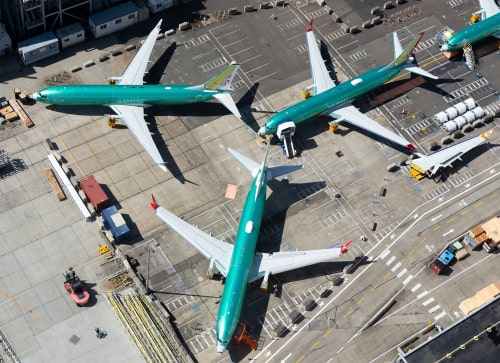
“It was the best of times. It was the worst of times” …
Senior figures at both Boeing and Airbus could be rightly forgiven for thinking these words sum up the recent years for the aviation industry, which has been rocked by event after event.
From the supply chain woes in 2018, to the grounding of the 737 MAX in 2019 and now COVID-19, it has not been the best of times for everyone involved in aviation.
Coming into the pandemic and subsequent lockdown, Boeing was already reeling from the grounding of the 737 MAX. With customers and clients ditching the model and regulators both in Europe and US turning the heat on Boeing, it was no surprise that Boeing surrendered its crown to Airbus as the largest aerospace manufacturer.
The ongoing turmoil within Boeing was compounded by the further delays with the 777x aircraft, with a planned 2020 launch back a year due to problems with the GEg X engine. Privately, many Boeing executives believe that the launch will be delayed even further due to greater regulatory scrutiny in approving the 777x.
Therefore, it was another blow to Boeing when Emirates announced that it was negotiating to delay the delivery of jets from Boeing. This follows Emirates’ decision in 2019 to reduce its commitment to the 777x aircraft, by swapping 24 of the jets for 30 Dreamliners. Similarly, Qatar Airlines said it will not be taking delivery of the 777x either.
Despite its reduction in orders for the 777x, Emirates is still heavily reliant on the Boeing 777, particularly the 777-300 ER passenger. With over 150 Boeing jets in its fleet, Emirates is the largest operator of the 777 globally. The advantage of the 777-300 ER is that it contains a large AFT cargo door (contained within the stem of the plane) that allows an extra six cargo pallets on top of the standard eight cargo pallets.
Yet, the problem surrounding outstanding orders is not just limited to Boeing. Speaking to The Seattle Times, Tim Clark, President of Emirates, said the company is contracted for 3 Airbus A380s at the end of 2020 along with additional “four or five” in 2021 at a cost of $1.5 billion, and that is with discounts.
Despite utilising the Boeing 777 jet, the airline has 115 Airbus A380s that have been sitting idle since mid-March according to the Seattle Times.
The growing backlog of orders at both companies has been driven by huge demand from the Far East and Middle East for new aircraft. From 2007 to 2016, Airbus received 9,985 orders while delivering 5,644 and Boeing received 8,978 orders while delivering 5,718.
COVID-19 has now put all of this under threat as Airbus and Boeing find their order backlogs “populated by airlines that never contemplated this happening, never contemplated that their ability to pay for these airplanes would be compromised” according to Tim Clark.
The trouble in Aviation does not stop with the Boeing and Airbus’ backlog but has spread across the global aerospace supply chain, which is on the verge of breaking point.
For many years, the aerospace supply chain has faced a dilemma: cut prices to a competitive rate or face losing their business with Boeing or Airbus. This was the case for Teledyne Technologies, owned by Teledyne Controls. Entering a “Faustian Pact” with the manufacturer, Teledyne cut their prices and inked deals to supply the Boeing 737 and Airbus A380. Teledyne banked on a lucrative deal that would last for decades.
Yet, many suppliers found themselves working to full capacity and even in some cases, beyond capacity, as they delivered vital parts to build the 737 and A380.
These stresses and strains on the aerospace supply chain which were already on a knife-edge, collapsed in the face of two cataclysmic events: the grounding of the 737 Max and COVID-19.
Demand collapsed and many suppliers’ finances went into the red, leaving many companies with a choice between bankruptcy, restructuring or a takeover according to Reuters. Teledyne Control has seen a 50% drop in revenue and has shed half of its 600 workers from its El Segundo, California Factory plant.
Spirit AeroSystems, GKN and Heroux-Devtok have all shed jobs too. Triumph Group, which produces parts for Boeing’s T-X Training Jet is planning a large lay off according to industry sources.
So, Boeing and Airbus are faced with a dilemma: Bring these technologies and suppliers in-house at a significant cost or let competitors buy up these suppliers. On the latter, Raytheon Technologies, with a $95 billion market value, are hoovering up smaller companies with an eye to boost their market presence.
In a statement made in April, at the launch of a $25 billion debt bond, Boeing said that the company was committed to “keeping liquidity flowing through our business and the 17,000 companies in our industry’s supply chain”. The company cited the $225 million paid to SpiritAero System for fuselages despite the COVID-19 lockdown and grounding of aircraft.
Yet, many industry figures say that behind the scenes, Boeing is putting significant pressure on “Tier 1” suppliers to allow liquidity and investment to flow to “Tier 3 and Tier 4” suppliers, who are reliant on US payroll protection from COVID-19.
While the spotlight is being focused on the problems in the supply chain and order backlogs, many analysts are rightly concerned about the insured value of the aircraft on the ground.
Analysis conducted by Russell Group has shown that there has been a $50 billion dollar increase in the exposure of grounded aircraft in just the top 10 airports, with many aircraft located in vulnerable spots such as the “Tornado Alley” in Tulsa.
Consequently, when the “return to flight” commences, aviation (re)insurers will find themselves with larger exposures in locations that they hadn’t expected.

Related Articles
Aviation
Aviation
Aviation